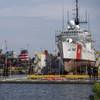Wrongful Death Lawsuit Against Tug Operator, Navy
After a four-day trial, a federal judge ruled on Dec. 18 in favor of the family of Freddie Porter, Jr., a 19-year-old U.S. Navy enlisted seaman from New Jersey who in 2007 was killed when the small craft carrying him was overrun by a tugboat pushing a large flotilla on Virginia's James River. The tug, owned and operated by Vulcan Materials Company, collided with the Rigid Hull Inflatable Boat (RHIB) carrying Porter as he engaged in nighttime military training exercises. The court found the United States Navy 80 percent responsible for Porter's death and Vulcan 20 percent responsible, awarding Porter's family $1,250,000.
Attorneys for the victim's family believe the judge's ruling against Vulcan and the Navy will have widespread implications for the nation's tugboat operations in U.S. waterways. Porter's family was represented by Kreindler & Kreindler LLP, the N.Y.-based maritime and aviation law firm.
The accident occurred on the James River near Jamestown Island, VA, the evening of October 11, 2007. Upon collision, Porter was sucked under the water beneath the 600 ft of the flotilla's eight barges and was eventually killed by the tug's propellers. Judge Henry Coke Morgan, Jr. of the U.S. District Court for the Eastern District of Virginia found in the wrongful death suit that Vulcan was liable for failing to post a proper lookout aboard the tug/barge flotilla, which otherwise would have prevented the collision. The judge held the U.S. Navy liable for assigning an inexperienced crew with inadequate supervision aboard Porter's vessel.
"The tragic accident which resulted in the wrongful death of Mr. Porter reveals safety shortcomings in the tugboat industry which merit immediate attention," said Daniel O. Rose, a partner at Kreindler who represented Mr. Porter's family at trial. "Our investigation of this incident found that easily correctable operational changes in how and where safety lookouts are posted on tugs and barges would greatly improve the safety conditions for all boats in the vicinity of tugboats as they traverse the nation's waterways," noted Mr. Rose, a veteran of the U.S. Navy as well as a licensed commercial multi-engine airplane and seaplane pilot.
The case was tried by the Kreindler firm and its co-counsel on the case, Breit, Drescher & Imprevento of Norfolk, VA, on behalf of Cassita Massiah, Porter's mother, who resides in Garfield, NJ, and other members of Porter's family. The court determined that while the Navy is primarily at fault for Porter's death, sovereign immunity protects the U.S. from having to pay Porter's family. Vulcan, however, was directed to compensate the family for the role it played in causing his death.
On the night he died, Porter, also of Garfield, was a student participating in a navigation training exercise aboard a RHIB, which is used by the Navy to support SEAL (sea, air and land) special forces operations worldwide. At the time of the accident, the RHIB was slowed or stopped on the James River (along the western shore of Jamestown Island near Norfolk) so that the crew could determine the type of vessel that was approaching. The bow of the flotilla being pushed by the tugboat "William E. Polle" then emerged from the darkness and collided with the RHIB carrying Mr. Porter and other Navy personnel. While his fellow seamen escaped to safety, Porter was sucked under the barges and then into the propellers of the tugboat.
"Vulcan should have known that a flotilla traveling on the James River, under the circumstances that prevailed on October 11, 2007, would need a lookout on the bow of the forward barge," said Judge Morgan in his written opinion and order. He added "The United States negligently operated an unseaworthy vessel by manning (it) with an incompetent crew."
"This ruling establishes a clear standard of safety for tug operators to post lookouts in order to avoid collisions with other boaters," said Rose. "In the face of the Court's finding of overwhelming fault on the part of the Navy, and no finding of fault by the Coast Guard or National Transportation Safety Board, this case further demonstrates that tug operators can still be found legally responsible for failing to do their part to prevent such collisions. Tug operators must post lookouts, even when operators of other vessels may be off course or improperly positioned on the waterways."
"I'm pleased that the judge assigned fault to those who were responsible for my son Freddie's death," said Massiah. "And I am hopeful that changes will be made soon in the tugboat industry that will better protect small boats on rivers so that no other parent has to needlessly suffer what we are going through."








